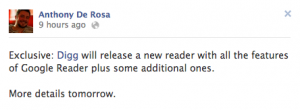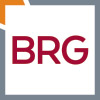14 Mar Google Reader Alternatives To Ease Your Pain
Last night Google announced the end of Google Reader, a very popular RSS aggregator service. Today we want to share with you why this is such a big deal and give you some next steps so you can keep reading your online news in one place.
What is an RSS?
RSS stands for rich site summary, though people also refer to it as real simple syndication. An RSS is essentially a web feed that people can subscribe to. People subscribe to those RSS feeds, and use aggregators to read all of their online news in one place. Think of an RSS aggregator as a personalized newspaper.
What is Google Reader?
Google Reader was one of the RSS feed news aggregators, and arguably the most popular. It started in 2005, and over the years it has become the standard in web aggregators. Google Reader allows bloggers to keep news organized in folders, and people who use the service can even share their RSS subscriptions with others. If you want to know more about Google Reader, Wired did a great job explaining what it is, and how it works last night.
The after-hours announcement
At time of the Google Reader announcement (9:00 EST last night), the outrage was felt and expressed by many because it is still the most widely adopted news aggregator tool around. Though the end of Google Reader has been expected for some time, it was still sad to learn that the tool will be gone soon. One of our friends said that for the old social pros, it was time to evolve with the times. This must be how our parents feel.
Why are people upset about the end of Google Reader?
- Google Reader made reading the news easy. By having all your blogs in one place, you never missed an article. You also didn’t have to spend time clicking from blog to blog to keep up with your favorite sites.
- Subscribing to a blog on Google Reader was dead simple. It took 15 seconds. That’s it!
- People that subscribed to your blog via Google Reader were more likely to see your posts than if they didn’t have an RSS aggregator. This is specifically why so many bloggers are angry. They see the end of Reader as lost readership.
Why did Google terminate Reader?
- Google Reader usage has declined over the years. People are reading their news in other ways.
- Many people are saying Google killed Reader because they are trying to force people into using Google+.
- Rumors are also suggesting that Google’s best social media engineers were spending their workdays with Reader, and Google wants them using those skills elsewhere.
- Google has a history failure when it comes to building social networks. (See: Wave, Buzz, G+.) They know this is an issue.
There are better tools, and better days ahead!
Google Reader users, it’s okay for us to be sad for a little while, but we need to move on. Google will terminate Reader on July 1. We have three months to find another solution. Maybe we will even like the change!
Google Reader alternatives:
- Digg. Last night Reuters social media editor shared the exclusive news that Digg will release a new and improved reader. This could be great news because though Digg has gone into the shadows over the last few years, they understand social media as it pertains to the consumption of news.

- Feedly. Feedly is a similar RSS aggregator to Google Reader. They have already shared tips for Google Reader users to move their RSS feeds to Feedly.
- Magazine style readers like Flipboard and Pulse. Pulse is in the process of being purchased by LinkedIn, so it’s possible that it won’t be so great in a few months. For those who don’t like change Flipboard may be a better option, especially for people on iPhones and iPads. The benefit of these readers is that they also integrate your social networks into your subscribed news.
- Newsblur is another reader that has the attention of many editors. The site keeps crashing this morning, so it is possible that many people are migrating here.
If you’re a Google Reader user, we hope you find one of these alternates helpful. If you’ve never used a news aggregator before, we hope you try one.
What news aggregator will you try? Tell us in the comments!
Update: Digg has confirmed that they will be building a reader. They aim to incorporate the best of Google Reader, and infuse social networks and communities into the mix. Click the previous link to read their blog post, and submit your wishes for their reader.






